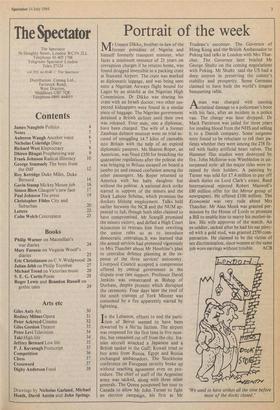Portrait of the week
Mr Umaru Dikko, brother-in-law of the former president of Nigeria and himself formerly transport minister, who faces a minimum sentence of 21 years on corruption charges if he returns home, was found drugged insensible in a packing crate at Stansted Airport. The crate was marked as diplomatic luggage, and was being seen onto a Nigerian Airways flight bound for Lagos by an attaché at the Nigerian High Commission. Dr Dikko was sharing his crate with an Israeli doctor: two other sus- pected kidnappers were found in a similar piece of baggage. The Nigerian government detained a British airliner until their own was released. Four men, one a diplomat, have been charged. The wife of a former Zambian defence minister went on trial ac- cused of smuggling 14.7 kilos of cannabis into Britain with the help of an expired diplomatic passport. Ms Sharon Roper, an American, was fined £350 for breaching the quarantine regulations after the polecat she was bringing to Britain escaped on board a jumbo jet and caused confusion among the other passengers. Ms Roper returned to America with her baby daughter but without the polecat. A national dock strike started in support of the miners and the Dock Labour Scheme, which promises the dockers lifelong employment. Talks held earlier between the NCB and the NUM ap- peared to fail, though both sides claimed to have compromised. Mr Scargill promised the miners victory, and defied a High Court injunction to restrain him from rewriting the union rules so as to introduce democratic centralism.It was learned that the armed services had protested vigorously to Mrs Thatcher about Mr Heseltine's plan to centralise defence planning at the ex- pense of the three services' autonomy. Liverpool Council accepted a compromise offered by central government in the dispute over rate support. Professor David Jenkins was consecrated as Bishop of Durham, despite protests which disrupted the ceremony. Four days later the roof of the south transept of York Minster was consumed by a fire apparently started by lightning.
Tn the Lebanon, efforts to end the parti- tion of Beirut seemed to have been thwarted by a Shi'itc faction. The airport was reopened for the first time in five mon- ths, but remained cut off from the city. Ira- nian aircraft attacked a Japanese and a British tanker in the Gulf; Kuwait tried to buy arms from Russia. Egypt and Russia exchanged ambassadors. The Stockholm conference on European security broke up without reaching agreement even on pro- cedure. The chief of staff of the Argentine army was sacked, along with three other generals. The Queen postponed her tour to Canada to allow Mr John Turner to fight an election campaign, his first as Mr Trudeau's successor. The Governor of Hong Kong and the' British Ambassador to Peking had talks in London with Mrs That- cher. The Governor later briefed Mr George Shultz on the coming negotiations with Peking. Mr Shultz said the US had a deep interest in preserving the colony's stability and prosperity. Some Germans claimed to have built the world's longest banqueting table.
Aman was charged with causing criminal damage to a policeman's boot with his face, after an incident in a police van. The charge was later dropped. Dr Mark Patterson was jailed for three years for stealing blood from the NHS and selling it to a Danish company. Some surgeons were found to be reluctant to tell their pa- tients whether they were among the 278 fit- ted with faulty artificial heart valves. The Hammer film studios were destroyed by fire. John McEnroe won Wimbledon in un- surpassed style: all the major titles were re- tained by their holders. A painting by Turner was sold for £7.4 million to pay off death duties on Lord Clark's estate. Reed International rejected Robert Maxwell's £80 million offer for the Mirror group of newspapers. He offered £100 million. The Economist was very rude about Mrs Thatcher. Mr Alan Monk was granted per- mission by the House of Lords to promote a Bill to enable him to marry his mother-in- law. His wife approves of the match. An ex-soldier, sacked after he had his ear pierc- ed with a gold stud, was granted £550 com- pensation. He claimed to be the victim of sex discrimination, since women at the same
job wore earrings without trouble. ACB `We used to have strikes all the time before most of the docks closed.'














































 Previous page
Previous page